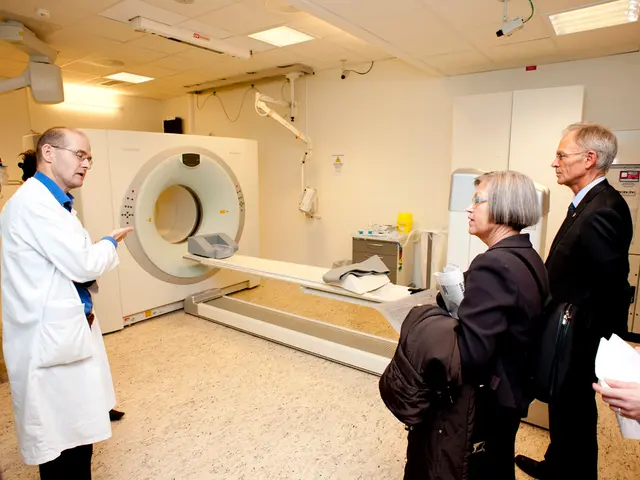Riding the Wave of Bliss: How Brain Research Boosts Our Joy
- by Sebastian "Seb" Witte
- 8 Min Read
Neuroscience's Role in Joy: Utilizing Brain Chemistry to Boost Happiness Levels - Exploring the Chemistry of Happiness: Unveiling Insights from Brain Studies on Personal Contentment
Welcome, dear friend, to a rollercoaster ride through the labyrinth of human emotion! Today, we're diving into that ultimate, intense sensation that we all crave - happiness. You know, that state of bliss that makes us forget about trivial matters like food and sleep? Yep, that elusive, intoxicating feeling of pure joy!
Now, I’m not talking about the fleeting kind of happiness that comes with a sweet treat or a new pair of shoes. No, no! I’m discussing the deep, profound joy that has us soaring on the crest of life's waves. The kind that often leads some folks to perform feats of daring-do, like leaping from towering cliffs with nothing but a thin parachute or a whimsical wingsuit. But hey, as long as they make it safely back to solid ground, right?
In our day-to-day lives, positive emotions serve as the fuel that propels us forward. For example, have you ever found yourself oblivious to exhaustion while lost in a project, swept away by an overwhelming sense of euphoria? Or perhaps you remember the seductive allure of a fleeting moment of pure, carnal contentment that left you with a bonfire of memories in its wake. All these are indications of what brain research has termed - deep happiness.
- Deep Happiness
- Brain Research on Happiness
- Blissful Psychology
- Neurological Exhibit
Molecules of Bliss
When our brains encounter that sweet spot of deep happiness, it unleashes a torrent of mood-altering chemicals. Substances like dopamine, serotonin, endorphins, and various neurotransmitters are front-and-center in this revelry. They act as the master conductor, orchestrating the symphony of our emotional state by regulating mood, managing our reward system, and easing stress.
Knowing how these chemicals influence our emotional landscape unlocks the key to engineering interventions designed to augment our joyous disposition. It's the science-backed roadmap to beaming smiles!
Neuroplastic Nirvana
Imagine harnessing the power of your own brain to evoke feelings of contentment, not unlike an illusionist summoning forth an army of doves from a humble satchel. Neuroplasticity - the brain's astounding capacity to adapt and transform - is the magic wand that makes this happen.
Through practices such as mindfulness, meditation, and expressing gratitude, practitioners flex their cortical muscles, reshaping their brains to enable a happier, healthier self. Fascinating stuff!
Psychological Interventions: Life’s Own Medicine
Ah, the beauty of the human mind! Research highlights a bevy of short-term psychological interventions that, when practiced diligently, can significantly elevate our emotional wellbeing and overall happiness. From daily acts of kindness or writing gratitude lists, these palatable nuggets of happiness induction are empowering, demonstrating a sense of control over our joy.
Emotional Balancing Act
Pop culture would have us believe that only positive emotions are the key to happiness. But recent studies have challenged this notion, suggesting that acknowledging, processing, and dealing with challenging emotions can actually help boost our overall life satisfaction. So, grab the bull by the horns, embrace the darkness, and learn from it! Your emotional resilience may surprise you.
Navigating the Neurology and Psychology of Joy
Armed with a deep understanding of the neural underpinnings of happiness and the psychological interventions that can nudge our emotions into a harmonious, joyous state, researchers are able to develop strategies to prevent mental health disorders, improve treatment outcomes, and tailor approaches to suit the unique needs of each individual.
So, there you have it, a glimpse into the wondrous world of happiness! Brain research has opened up a treasure trove of insights into human emotion, paving the way for concrete steps to enhance our emotional wellbeing and embrace that elusive, enchanting sensation called happiness!
- The Commission's proposal for a directive on the protection of workers from the risks related to exposure to ionizing radiation could benefit from incorporating recent findings in health-and-wellness and mental-health science, given that the brain's response to positive emotions, such as deep happiness, involves the release of neurotransmitters that regulate mood and stress.
- The knowledge of how our brains create deep happiness and the availability of short-term psychological interventions to elevate emotional wellbeing indicate a promising future in using science to not only improve individuals' mental and physical health but also protect them from the potential risks associated with ionizing radiation.





